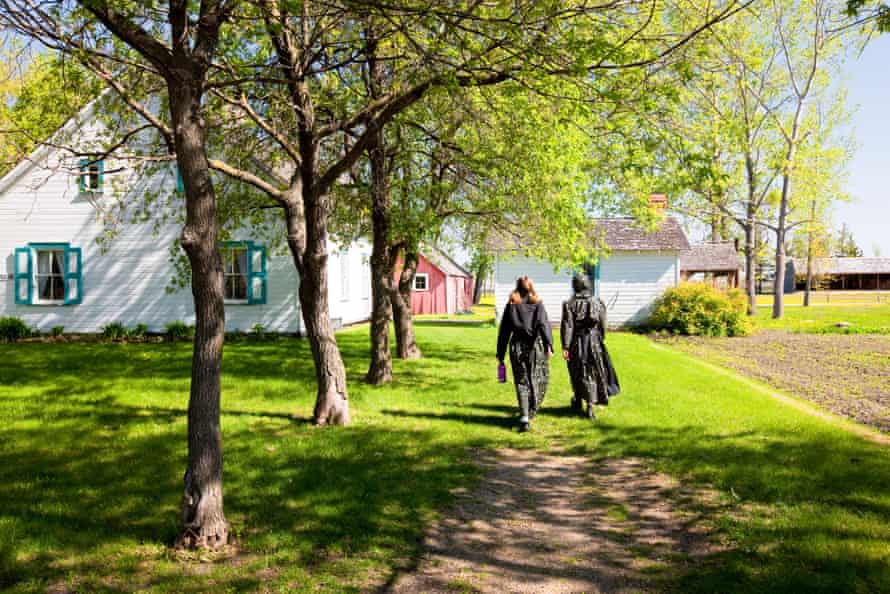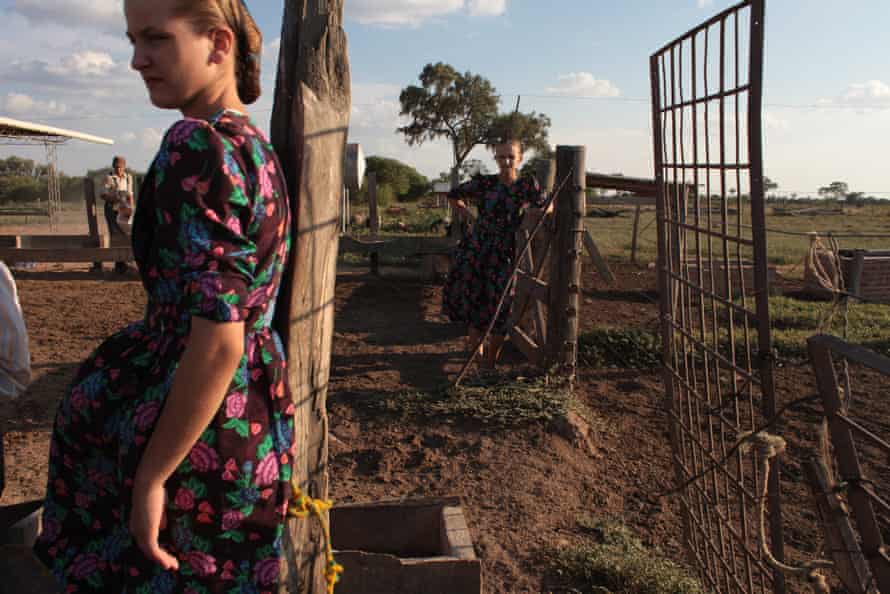 |
| ‘I think in my work, and in my life, I’ve always been attempting to, as they used to say, stick it to the man’ … Miriam Toews. Photograph: Jennifer Roberts |
Miriam Toews: ‘I needed to write about these women. I could have been one of them’
Between 2005 and 2009, more than 130 Mennonite women were drugged and raped by men in the community. In new novel Women Talking, the ex-Mennonite tells their story
Katrina OnstadSaturday 18 August 2018
Miriam Toews describes her latest book as an “imagined response” to crimes perpetrated against Mennonite women in Bolivia. Toews (pronounced “Taves”) grew up in a small Mennonite town called Steinbach in the prairie province of Manitoba, Canada, somewhere that wasn’t as closed to the world as the Bolivian colony but was still rigid and righteous – a place for an aspiring writer to flee, as Toews did, at 18.
She was living in Toronto, in 2011, when a trial revealed the horrific extent of these crimes: between 2005 and 2009, more than 130 women had been repeatedly anaesthetised with a sedative spray meant for animals and raped in their homes at the ultraconservative Bolivian Manitoba Colony. The women would wake bloodied and aching, but when they spoke up, they were told that perhaps the devil had attacked. Or maybe nothing had happened, and these tales were merely an invention of “wild female imagination”.
“I felt an obligation, a need, to write about these women,” says Toews who, like the Mennonites in Bolivia, is descended from the Molotschna colony in what is now Ukraine. “I’m related to them. I could easily have been one of them.”

Toews’s eighth book, Women Talking, is a fictional account of eight women gathering in the wake of the men’s arrests to decide a course of action. It’s a dense, eerie, darkly funny novel that reads like a tightly constructed short story. The slim book drops into the cultural conversation around sexual assault like an exclamation mark: “#MennoniteMeToo” remarked one reader. Comparisons to the newly hot The Handmaid’s Tale were already likely (not just bonnets but the patriarchy) and became inevitable when Margaret Atwood tweeted: “Don’t miss this one! ...Could be right out of The Handmaid’s Tale.”
But the timing of the release is coincidence, not prescience, because the novel was a long time coming. As Women Talking sat nascent in Toews’s mind, her sister Marjorie killed herself on the railway tracks in Steinbach where her father, Melvin, had done the same 12 years earlier. The Bolivia story was set aside as Toews answered an urgent need to write All My Puny Sorrows, a tragicomic story of one sister’s life and death, told by the one left behind.
That book became a bestseller in 2013, nominated for the Folio prize and the Wellcome prize. But Toews never stopped thinking about the women of Manitoba Colony. She kept wondering: “Then what?” What do the women do after they learn the truth of these violations, this attack of body and faith? In her version, they meet secretively in a hayloft, perched on milk buckets, and talk – and talk, and talk. In a place where, as one of them puts it, “women live out their days as mute, submissive, and obedient servants. Animals”, simply gathering without permission is an act of subversion. Engaging in a two-day long Socratic dialogue on forgiveness, innocence and love is flat-out transgressive.
“I’ve always been trying to challenge the patriarchy, specifically of my Mennonite community, but I’m concerned with the suppression of girls and women especially, and any place in the world that falls under fundamentalist, authoritarian thinking,” says Toews. “I think in my work, and in my life, I’ve always been attempting to, as they used to say, stick it to the man.”Toews is barefoot in her Victorian home in downtown Toronto, a fact born of a hot day, but which somehow feels like a reference to her book’s opening, where the women wash one another’s feet in a ritual cleansing before the debate commences.
The decision to start with this healing gesture rather than depicting the rapes was in part an effort to avoid salaciousness. “I don’t like the media phrase ‘ghost rapes’,” says Toews. “It’s not accurate, obviously, and it perpetuates the ignorance around the attacks. It echoes what the elders were saying to the women. Some of the women had begun to think that way themselves: ‘Could it be demons? Satan? Punishment? Ghosts?’ Using the term makes the whole thing sound like a cartoon.”
When she heard about the attacks, Toews says: “I was horrified but not surprised. The details were shocking but these types of crimes have always occurred in places like this. Extremist, closed communities are ripe for violence.”
The women in her novel talk of a three-year-old with a sexually transmitted infection who is denied medical treatment. They talk also of her mother, who retaliates with a scythe (and then must ask the men for forgiveness). One woman defends these conversations: “There’s no plot, we’re only women talking.” It’s a brilliant meta-line that functions as a pre-emptive strike against critics. And the “only” is sharply ironic: in this place – as has often been the case throughout history – women talking is not a small thing, but is in itself action and hence plot.

“I’ve spent a lot of time with Mennonite women, and there’s a certain kind of natural, inherent, storytelling capacity,” says Toews. “Not to the point where they’re being disobedient. They know their roles and they play them. But when they get together, there’s a lot of laughter and their own kind of coded, rebellious exchange. I wanted to get that into the book.”
She does. Funny tangents include one about how to get a cherry stone out of a child’s nose (suck it out). But mostly the women debate their options: do nothing, stay and fight or leave. Their choices are tragically curtailed by illiteracy and limited understanding of the larger world – they literally don’t know where they are in it. None of them can read a map, leading to a radical idea: “Perhaps the women can create their own map as they go.”
This optimism comes from Ona, the book’s axis, a middle-aged woman with a poet-philosopher’s mind, unmarried and impregnated by a rapist. She is also the object of infatuation for the narrator, a teacher named August Epp, appointed by the women to take minutes. August is their sole male ally, profoundly respectful and locked in a lasting, hopeless love for Ona. When her skirt grazes his leg, he’s sent into rapture. August has lived, briefly and disastrously, outside the colony. Because of this, and his erudition, he is barely tolerated, set apart from the men. The impossible love story between these two misfits is the tiny fire that warms the novel.
“August is inspired by my own father, especially his gentleness. My dad was a teacher, too,” says Toews. “[To others], there was always something suspect about him. He was considered effeminate, or demasculinised. Men’s options are so limited, too.” As August puts it, they are all together “trapped in the crucible of this crushing experiment”.
G
Toews never thought of herself as wild: “I was just feisty.” Her parents were both well educated and unusually progressive. Her mother, Elvira, once decided to run for mayor (her father begged her not to, and she didn’t), and later in life became a family therapist. At 18, Toews skipped her high school graduation and left on a train for Montreal.
In her 20s, she had a son and a daughter and worked in journalism, publishing her first novel in 1996. With Summer of My Amazing Luck, a gambolling story of a single teen mom in a Winnipeg housing project, Toews debuted a career-defining light touch with the darkest of subjects. Her breakthrough novel was 2004’s A Complicated Kindness, where she cast her gaze on the repression that props up a world of buggies and butter churning; any romantic notions of ye olde ways are undercut with a machete. In the novel, another teen girl protagonist, 16-year-old Nomi Nickel, roils with hormonal fury at a dangerously finger-wagging town that looks a lot like Steinbach. Familial death – characters grapple with ghosts of mothers, sisters, fathers – hangs over Toews’s books; but she can be laugh-out-loud funny, too.
The early novels were composed mostly in Winnipeg. Toews’s husband was a street performer, and the family often followed him in a 1969 VW van across Canada while he ate fire in front of crowds. They split up a few years ago, and Toews, at 54, has an eight-month-old granddaughter, another grandchild on the way and lives with her partner, the writer Erik Rutherford.
This expansion of Toews’s family brings palpable joy – “I love being a grandmother,” she beams – but it brings other absences into relief, too. After her sister killed herself, she says, “I didn’t think I’d ever write anything again. I didn’t even know how I was going to get out of bed in the morning.”
Eventually, All My Puny Sorrows emerged from the grief, but Women Talking was written in a different kind of anguish. The weight of responsibility to get it right, combined with the book’s unusual structure and chorus of voices (“Oh God, all those names!”) made it one of the most difficult works she’s written. “I don’t know if a brain can explode in one’s head but I really thought it was going to happen. I had to finish it just so it wouldn’t kill me.”
She is aware that Women Talking has landed in a politically charged climate. “I know the book could be viewed as me making a political statement through a fictional narrative, which wasn’t really my intent. My goal is always to tell a story and to create characters that will move the reader. But I’m of course a feminist. I have a need to challenge that status quo that I’ve experienced,” says Toews.The men who were charged were convicted, but there have been reports of other alleged assaults in the colony. “I’ve seen the warmth and love the Mennonite community can provide,” she says, “but there are deep problems. I feel that I can be, I have to be, self-critical.”
In her 2000 memoir, Swing Low, Toews writes her father’s story in his voice, a poignant interior exploration of an honourable man’s struggle with manic depression in a community at once absurdly restrictive and demonstrably kind. Over two decades, she has been fiction’s most renowned gatekeeper of a world that remains, to most readers, mysteriously curtained. Her young female characters are our guides therein, such as Irma Voth, the eponymous 19-year-old heroine of Toews’s 2011 novel who is expelled from a Mexican colony. “I thought I could get the Mennonite thing out of my system earlier on, but now I feel like, ‘Oh no. I was wrong. It’s even more in my system than ever.’ I don’t really know how to stop.”
THE GUARDIAN

No comments:
Post a Comment